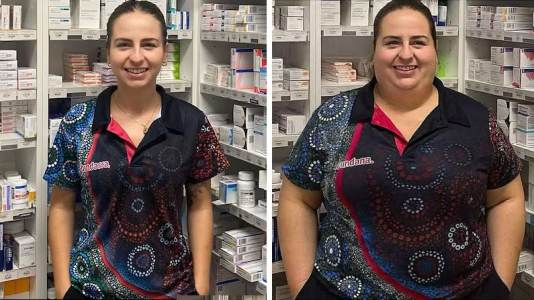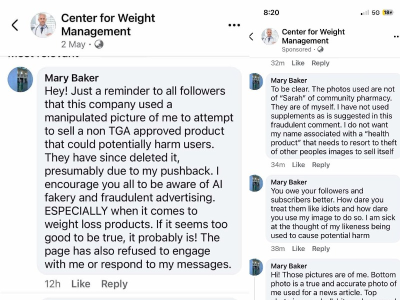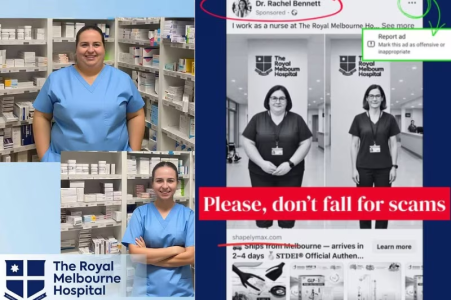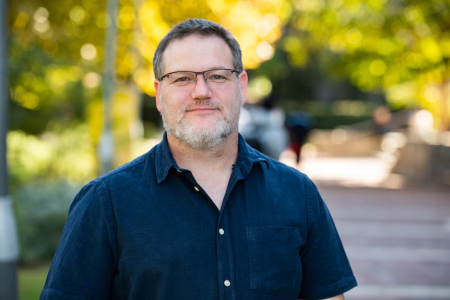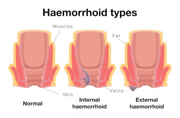Pharmacist's stolen image used in 'dangerous' deepfake adverts for weight loss drug
By
ABC News
- Replies 0
Mary Baker never anticipated she would see herself in a fabricated advertisement spruiking weight-loss medication.
But she did, after receiving a message from a former colleague.
"… I've just seen this picture, is this you?" the message read.
"Do you know they're using it?"
The Facebook advert included a fake endorsement showing the pharmacist in a doctored before-and-after image promoting herbal weight-loss products.
"At first I couldn't help but find it kind of funny," Ms Baker said.
"They've doctored it so ridiculously."
The "before" shot is thought to have been created using artificial intelligence.
The "after" shot is a real photo of Ms Baker, taken from an ABC article about her award-nominated work to provide residents living in flood-affected communities in Western Australia's Kimberley with vital medications.
In the advertisement, an image of "Sarah" was placed alongside a fictional background story explaining her "success".
"My name is Sarah and I live in Sydney," the advert read.
"I have long been too self-conscious to come out from behind the counter at the community pharmacy I work in, but thanks to this miracle product I could finally have the confidence to be myself."
Ms Baker said she was shocked.
"They've come up with this whole story for me and and it's just so ridiculous because it's just not me," she said.
But within days, more ads started appearing with Ms Baker in different uniforms.
"I was expecting it to be a silly one-off," Ms Baker said.
"I found the page, reported it and thought that would be the end — but then more people started sending it to me.
"It got less and less funny and I got really quite angry."
Ms Baker, who now lives in Queensland, said while the doctored image was a violation, she was "incredibly angry" at those behind the scams due to the harm it could cause.
"I'm disgusted by these companies that are profiting off the weight-loss industry and things like body dysmorphia," she said.
"That was what upset me more than anything — the thought I could be associated with something potentially causing harm to people in terms of their mental health and the way they see themselves.
"If they buy this medicine which is not Therapeutic Goods Administration approved — it could be anything."
She also commented on the original posts and attempted to email the addresses listed on the websites' shopfronts.
However, she was blocked by the administrators of the Facebook pages and her comments were hidden.
One of the fake endorsements included a logo for Royal Melbourne Hospital (RMH).
In a post published on social media, RMH said it was aware of several fake ads claiming to be endorsed by the hospital and its staff.
"The RMH does not provide any endorsements or sponsorships for products or therapies," the post read.
"Scammers are also impersonating and creating fake identities of doctors and nurses, claiming they work at the RMH.
"The RMH does not provide medical advice or prescribe medicines over social media."
When investigating the advertisements, the ABC received a bounce-back reply from company e-mail addresses.
Meta did not provide a response to ABC questions.
He said Ms Baker's image was "clearly manipulated with artificial intelligence tools" with almost "no effort".
"Unfortunately, the generative AI tools have made this so much easier to do," Professor Leaver said.
"Anyone can grab an image and run a couple of prompts and generate the before-and-after photo."
Professor Leaver said while the use of Ms Baker's photo without her consent and its manipulation was against the law, legal action could be problematic due to the cost.
"There is a lot of this stuff and it ranges from very high-profile individuals … all the way through to individuals who, while they have some legal recourse, probably won't end up using that because the actual effort involved," he said.
Professor Leaver said laws designed to take fake endorsements down could not keep up.
"It's very difficult to prevent," he said.
"There is risk every time we share something online, and that risk is greatly exacerbated when images can be essentially taken, manipulated and shifted contexts."
Professor Leaver said in many cases, the person whose image had been used never found out.
"In the long run, we need platforms to do a lot better at taking these sorts of things down," he said.
"It is pretty tricky to get them taken down other than hitting that flag and report button as quickly as you can."
By Esse Deves
But she did, after receiving a message from a former colleague.
"… I've just seen this picture, is this you?" the message read.
"Do you know they're using it?"
The Facebook advert included a fake endorsement showing the pharmacist in a doctored before-and-after image promoting herbal weight-loss products.
"At first I couldn't help but find it kind of funny," Ms Baker said.
"They've doctored it so ridiculously."
The "before" shot is thought to have been created using artificial intelligence.
The "after" shot is a real photo of Ms Baker, taken from an ABC article about her award-nominated work to provide residents living in flood-affected communities in Western Australia's Kimberley with vital medications.
In the advertisement, an image of "Sarah" was placed alongside a fictional background story explaining her "success".
"My name is Sarah and I live in Sydney," the advert read.
"I have long been too self-conscious to come out from behind the counter at the community pharmacy I work in, but thanks to this miracle product I could finally have the confidence to be myself."
Ms Baker said she was shocked.
"They've come up with this whole story for me and and it's just so ridiculous because it's just not me," she said.
More fake adverts appear
Ms Baker thought the fake endorsement was an isolated appearance.But within days, more ads started appearing with Ms Baker in different uniforms.
"I was expecting it to be a silly one-off," Ms Baker said.
"I found the page, reported it and thought that would be the end — but then more people started sending it to me.
"It got less and less funny and I got really quite angry."
Ms Baker, who now lives in Queensland, said while the doctored image was a violation, she was "incredibly angry" at those behind the scams due to the harm it could cause.
"I'm disgusted by these companies that are profiting off the weight-loss industry and things like body dysmorphia," she said.
"That was what upset me more than anything — the thought I could be associated with something potentially causing harm to people in terms of their mental health and the way they see themselves.
"If they buy this medicine which is not Therapeutic Goods Administration approved — it could be anything."
Blocked and comments hidden
Ms Baker said she reported the ads and Facebook pages to the social media platform's parent company Meta.She also commented on the original posts and attempted to email the addresses listed on the websites' shopfronts.
However, she was blocked by the administrators of the Facebook pages and her comments were hidden.
One of the fake endorsements included a logo for Royal Melbourne Hospital (RMH).
In a post published on social media, RMH said it was aware of several fake ads claiming to be endorsed by the hospital and its staff.
"The RMH does not provide any endorsements or sponsorships for products or therapies," the post read.
"Scammers are also impersonating and creating fake identities of doctors and nurses, claiming they work at the RMH.
"The RMH does not provide medical advice or prescribe medicines over social media."
When investigating the advertisements, the ABC received a bounce-back reply from company e-mail addresses.
Meta did not provide a response to ABC questions.
Removing content problematic
Curtin University internet studies professor Tama Leaver said similar scams had been around for more than a decade.He said Ms Baker's image was "clearly manipulated with artificial intelligence tools" with almost "no effort".
"Unfortunately, the generative AI tools have made this so much easier to do," Professor Leaver said.
"Anyone can grab an image and run a couple of prompts and generate the before-and-after photo."
Professor Leaver said while the use of Ms Baker's photo without her consent and its manipulation was against the law, legal action could be problematic due to the cost.
"There is a lot of this stuff and it ranges from very high-profile individuals … all the way through to individuals who, while they have some legal recourse, probably won't end up using that because the actual effort involved," he said.
Professor Leaver said laws designed to take fake endorsements down could not keep up.
"It's very difficult to prevent," he said.
"There is risk every time we share something online, and that risk is greatly exacerbated when images can be essentially taken, manipulated and shifted contexts."
Professor Leaver said in many cases, the person whose image had been used never found out.
"In the long run, we need platforms to do a lot better at taking these sorts of things down," he said.
"It is pretty tricky to get them taken down other than hitting that flag and report button as quickly as you can."
By Esse Deves

